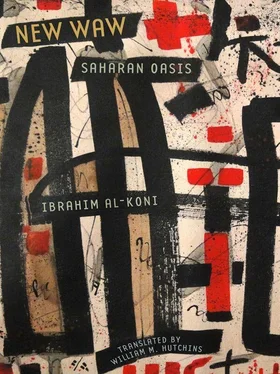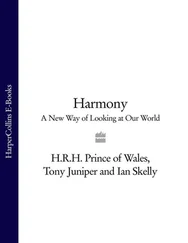The elders’ debate lasted for days. Finally they sent a messenger to the Temple Priestess with a question that would put an end to their doubts. They received in return a square of leather with the prophecy two days later: “Water in the sky, and water on the earth: if you lack water in the sky, search for water in the earth.”
They abandoned their debate and consulted with each other. They scouted all four directions and reached a consensus in favor of the depression that lay south of the plain. Then they sacrificed a young billy goat and began to dig.
2
The poets sing in praise of the Red Hammada’s beauty, calling it the sky’s true love. It rises far above the elevation of the other deserts, reaches into space, and pursues distant stars on its way to unite with its beloved. It utilizes shanks of solid rock and strives to reach the heights on pillars of mountain peaks. But it stops halfway for a reason the ancestors did not explain, not even in the traditions of the first fathers. The later generations did inherit from their grandfathers sad songs that compare this patch of ground suspended in the celestial void to a nomad who chose solitude, not because he wanted to flee from people but because he pitied people. Then he lost his way, and the labyrinth became his sole homeland. The Hammada that swims in space’s expanses is another vagabond homeland. Thus it has not obtained its share of water from the sky, thirst has parched its lands, and it is incapable of chasing after the waters that flee to lowlands of the Southern desert (where the lake of Great Waw once swelled and where a mighty sea of sand cowers today) or slip to the North to pour their gift into the distant sea. So it is said that the Red Hammada is the only desert area that feeds neighboring regions with its blood, gives other deserts the secret of life, and chooses drought as its destiny — pursuant to the Law’s dictates, which say that a parched land is nobler than wet ones.
Despite the terrifying elevation, despite the deluge’s flow to the North and South, the suspended desert found a way to conceal its waters in severe, solid stone. Thus since the most ancient times the nomad’s hand has reached down to dig in solid boulders shafts so deep that the eye cannot discern the bottom. Later desert dwellers called these passages “wells.”
From the West appeared unidentified ancestors, who settled there. They enjoyed living in the expanses of the suspended body. They were, however, soon caught off guard by the heat and tasted the bitterness of thirst. So they split open the earth’s belly and crumbled the solid stone with their hands. They were not destined to reach water for several generations. For years tribes have passed down to the next generation the well of the Western Hammada, giving it many names, which changed from one generation to the next. The last of these was Efartas.
People came from the South and met the same fate as the ancient people from the West. They dug into the dirt with a zeal that surpassed the ardor of rats. Far down they reached water and gave the Southern well many names. The last of these was “Thirsty Man’s Well.”
Peoples arrived from the North and proceeded to search for their share of water in the depressions of the awe-inspiring mountain ranges that characterize the North. Local historians relate that the luck of these peoples was worse than that of the other tribes. They dug very many wells before they drew water from two called Awal and Emgharghar. Herdsmen still discover the vestiges of all these wells and find their mouths sealed with circular slabs of cut stone. They are delighted, exult, and call back and forth to each other, thinking that they have discovered a new mouth for the earth. But their joy turns to sorrow when they discover that the well is nothing but an empty pit. Despite their disappointment, the sages did not despair. Frequently they found random wells that were more like cisterns, because their water was not merely fetid, bitter, or weird smelling but the quantity was limited and was exhausted as soon as herds of camels visited it once or twice.
The strangest, deepest, and oldest well, however, is Harakat, which is situated at the heart of this suspended planet. In their songs poets refer to it as “the gift from the people of passion” or “the lovers’ miracle,” because narrators say that a lover who was a member of the first tribes dug it as a symbol of fidelity to his beloved, who was coming from the East to marry him when thirst killed her en route. The lover wept a long time for her. Then he realized that his glory would come not from weeping for his beloved in verse but in conquering the ghoul that had taken her from him.
The lover searched the Hammada from the extreme East right through the central areas inch by inch and scoured it with an army of hired assistants, servants, and vassals. Then he did not discover even moisture left behind by floodwaters in the lowest strata of the earth. All the same, he hired more workers, purchased armies of slaves, made use of people coming from every direction, and proceeded to fight the rock and to chisel away the solid stone without succeeding in discovering the treasure. The tops of many wells caved in during this struggle as the earth claimed its sacrificial offerings repeatedly through cave-ins. Many slaves fled and even more hired hands quit, but the lover bought more slaves to replace those who had fled and paid the new workers even more liberally, replacing the army of explorers who had quit. So the excavations continued with even greater zeal each time he welcomed a new army into his ranks as recruits. Other tracts of land were harrowed as time passed. The commander of this army was the only person who wasn’t conscious of the passage of time, who did not notice the changing seasons, and who did not hear the screams of the many babies who were born. Likewise information about people who grew tired and lay down beside their fathers beneath piles of rocks in the tombs of the slopes escaped him. He kept stooping over the earth, inspecting its markings as if reading in them a prophecy that confirmed that life did not consist of trekking like nomads across vast expanses in search of a rendezvous beyond the horizon. Instead, life meant kneeling on the ground and searching for treasure in the deepest pits. For this reason, wrinkles formed on the lover’s skin, and networks of veins showed on his face and arms. His heart, however, did not grow old, and the sparks in his breast did not die out. In this way he lost all his peers and contemporaries, all the members of his generation. He became his generation’s sole heir.
He was his generation’s heir because he did not follow his generation’s path. His peers disappeared because they spread over the earth, seeking something that did not exist. He differed from his peers because he did not move across the earth and did not waste time on what the earth lacked. His contemporaries had long ago passed away, bequeathing life to a person who had renounced life and did not wish to inherit what other people considered life. The lover had forgotten the goal of the desperate digging and had forgotten the reason for this lethal struggle, because he had forgotten himself for an even longer period. So he did not even lift his eyes from the earth when his workers came to him and brought him the good news that the solid rock had finally been vanquished and that water was spurting from the hard stone.
3
Songs celebrate the water that gushed from the granite with all the abundance of a spring and continued to flow into the wasteland during all the bygone years after the lover’s age. In subsequent generations, however, the treasure began to retreat, and the earth started to swallow its water, which disappeared from sight. Reaching the water required a sturdy set of palm-fiber ropes. Soon tribes were talking about travelers who headed to the well but perished while circling the mouth and looking down the pit at the sight of the water, because they hadn’t provided themselves with sufficient quantities of rope. In other times, clever planners attempted to remedy the problem by leaving piles of palm-fiber ropes at the well’s mouth as a benefaction for wayfarers. But sun and dirt got to the ropes before travelers did and destroyed them in short order. Then the sages introduced a new law that in time became a noble tradition. It required everyone who came to the well — whether herdsmen, caravan owners, or nomadic tribes — to bring a quantity of rope to leave behind at the mouth of the well in exchange for water. So piles of rope accumulated by the mouth of the well, and bulky clusters of rope littered the area in networks that stretched here and there. Coils of palm-fiber ropes transformed the adjacent bare land into a veritable rope jungle. The savage sun devoured some ropes as the fiber turned white; dust and grit mangled the rest. Not only did the color fade, but the rope became frayed and disintegrated. Other piles more recently created looked brand new from a distance. A person seeing them imagined that he would inhale their fresh scent when he approached — the scent of fresh, moist palm fiber, the smell of the oases, and the aroma of dates and of seasons of ripe dates at the beginning of fall.
Читать дальше












